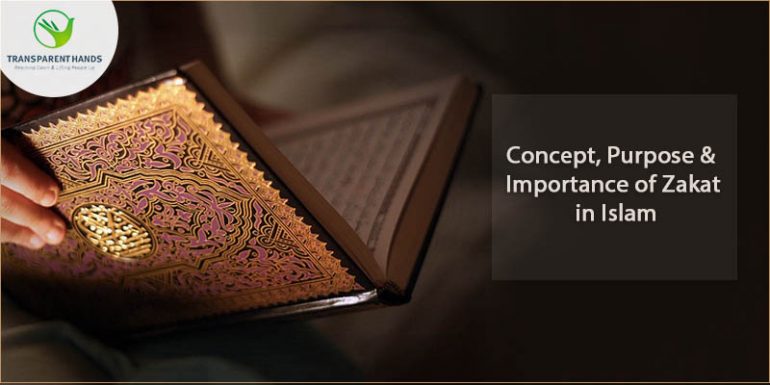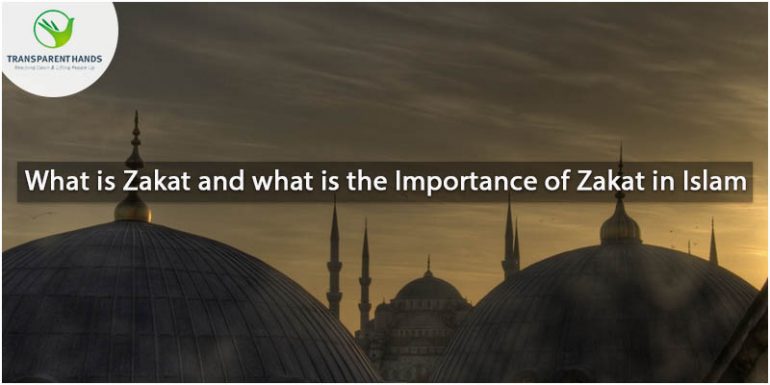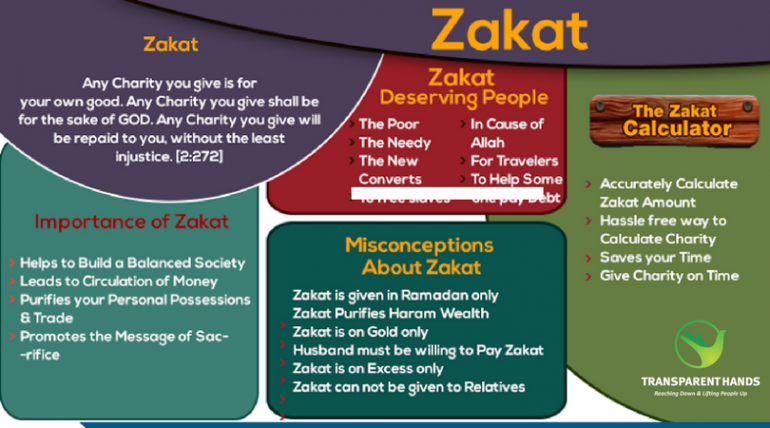Concept, Purpose and Importance of Zakat in Islam

The concept of Zakat:
Islam is not only a religion but a complete way of life which acts as the guidance for Muslims and encourages them to walk on the path of peace, mercy, and forgiveness. Amongst the five pillars of Islam that frames the Muslim life; concern for the needy or Zakat is extremely important. Concept, Purpose, and Importance of Zakat in Islam.
According to Islamic principle, all things belong to Allah and that wealth is held by human beings in trust. The word Zakat means ‘purification’ and ‘growth’. Our possessions are purified when we give a proportion for those in need and this act of giving balances and encourages new growth in our economy. Each Muslim calculates his or her own Zakat separately. For most purposes, this involves the payment each year of two and a half percent of one’s capital.
A generous person may also give as much as he or she pleases as ‘Sadaqa’ but it is more likable that it is given away in secret because when we give Zakat it is therefore to please Allah and not for mere show-offs or personal gain. Although ‘Sadaqa’ means ‘voluntary charity’ it has a deeper meaning.
The Prophet Muhammad (SM) said “Even meeting your brother with a cheerful face is charity.’The Prophet continued: ‘Charity is a necessity for every Muslim.”
-> What is Zakat and What is the Importance of Zakat in Islam

According to The Prophet even if a person has nothing he should work with his own hands for his benefit and then give something out of such earnings in charity. In case if a person is not able to work, The Prophet said: “He should help the poor and needy persons and if he fails to do so he should urge others to do good.” Further, if the person lacks that also, The Prophet said “He should check himself from doing evil. That is also charity.” Therefore, Zakat or Sadaqa is an obligation in Islam to be practiced whether we have access to an abundance of wealth or not. We have to be charitable in times of abundance and as well as in times of adversity.
The Purpose of Zakat:
The basic objective of paying Zakat is to create balance in the society and never let a poor and needy to suffer or die. The Zakat is compulsory when we have a specific amount of Gold, Silver or other properties that can be weighed and calculated . In the Holy Quran, it has been emphasized too many times to offer prayers and to pay zakat.
The basic purpose of Zakat is to maintain economic balance in society so that circulation of wealth continues from rich to poor and never stays in one hand. In this way, we can overcome poverty and other social evils from our society. The zakat purifies our wealth as it goes into the hands of rich to poor, stabilizes economic condition of the society and ensures that each person is benefitted from the wealth. The rich people have to pay zakat so that differences and gap between rich and poor is reduced and this way we can guarantee human rights for all. The Zakat helps to shape the human character of the rich people as it saves them from greediness and selfishness and it establishes the concept of brotherhood and unity.
Wealth is usually earned individually by hard work and intense dedication. So when we give or share even a small portion of this, it reflects our strong faith in Allah. It makes us realize what is given by the Grace of Allah and what we spend.. Allah is pleased with those who spend happily in His cause.
The Importance of Zakat:
Poverty is one of the greatest drawbacks of our modern civilization. Poverty has always been widespread in the world. The Quran takes a closer look at poverty and has recommended several ways to reduce its suffering and grief in society. Charity can help remove the envy of the poor and instead cultivate a feeling of a fellowship from the recipients.

Whenever possible, we are encouraged to do actions for the pleasure of Allah.There are two types of giving: one is Zakat and the other is Sadaqa. Zakat is obligatory and stands at a specific rate of 2.5% on all our properties that can be weighed, whereas Sadaqa has a wider meaning.
The vital importance of Zakat is reflected as the law of Allah: “My mercy encompasses all things, but I will specify it for the righteous who give Zakat.”
(The Quran: verses:7:156).
Zakat has to be carefully calculated and given away on a regular basis whenever we receive any income. Government taxes should be deducted, but not other expenses such as debts, mortgages, and living expenses. If one does not know any needy person, he or she may give the Zakat to a mosque or charitable organization with the distinct purpose of helping the poor and sick. Charities given to mosques or hospitals or organizations can be considered obligatory as Sadaqa.
Again in the Quran in ( verses:3:92), it is mentioned “You cannot attain righteousness until you give to charity from the possessions you love. Whatever you give to charity, the Almighty is fully aware thereof.”
In giving charity, we have to be humble and never act as if we were doing a favor because pride diminishes good deeds in Islam. We should be careful and make sure we give to the recipient with the utmost respect. We cannot boast that we gave the charity. The Quran warns against this attitude.
Whatever we give to charity should be what we would accept if it were offered to us. Many people give away only those items which they feel are not good enough for themselves. The Quran clarifies this and has forbidden such acts as mentioned in (verses:2:267) “ You who believe, you shall give to charity from the good things you earn, and from what we have produced for you from the earth. Do not pick out the bad therein to give away, when you yourselves do not accept it unless your eyes are closed. You should know that Almighty is Rich, Praiseworthy.”
All these verses clearly tell us what we should do while performing charity.While giving charity we should be selfless, straightforward and eliminate our ego. Our life on earth is only decided by Allah and death can come at any moment and we cannot ask for more time. Hence every opportunity should be used to do righteous deeds and we should give to charity from the abundance that Allah has granted us.










Leave Your Comments